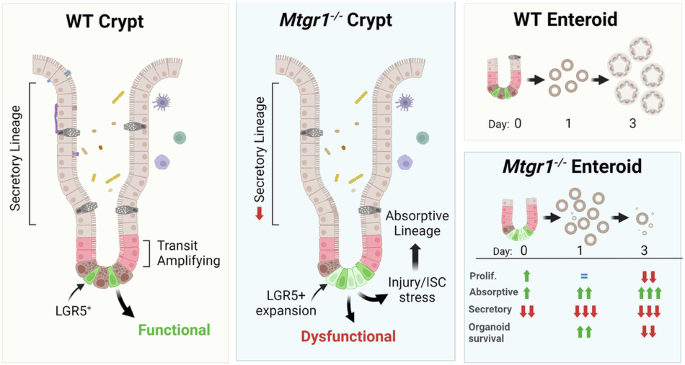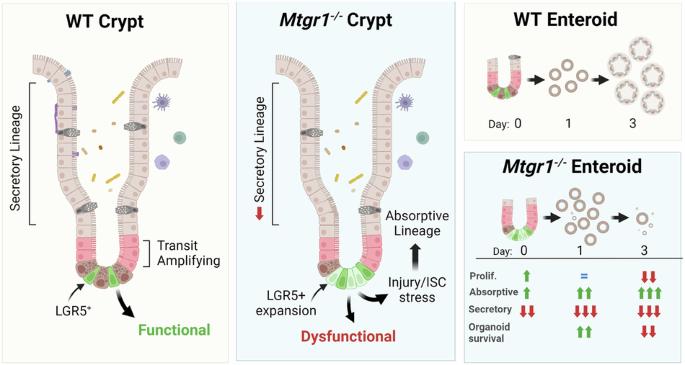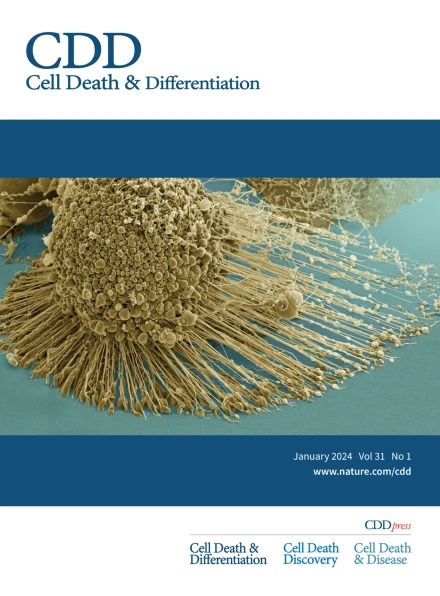MTGR1 是维持小肠干细胞群的必要条件
IF 13.7
1区 生物学
Q1 BIOCHEMISTRY & MOLECULAR BIOLOGY
引用次数: 0
摘要
未分化的肠干细胞(ISC)对维持体内平衡和解决损伤至关重要。隐窝基部的Lgr5+细胞不断分裂,推动子细胞沿隐窝轴向上分化成特化细胞类型。必须协调执行复杂的转录程序,才能维持未分化干细胞,同时分化出平衡所需的各种肠细胞。在此之前,髓系易位基因(MTG)家族成员已被确定为转录共抑制因子,在包括肠道在内的多个器官系统中调节干细胞的维持和分化程序。MTG家族成员之一,髓样易位基因相关1(MTGR1),已被认为是分泌细胞分化和损伤反应的关键调节因子。然而,MTGR1 是否有助于 ISC 的功能尚未得到研究。在这里,我们利用 Mtgr1-/- 小鼠评估了 MTGR1 缺失对 ISC 生物学的具体影响。有趣的是,MTGR1的缺失增加了表达Lgr5(循环ISC的典型标记)的细胞总数,这表明干细胞的总体数量增加了。然而,扩大的转录组学和功能分析表明,Mtgr1缺失的ISC存在缺陷,包括ISC相关转录程序失调。在体内外,由Mtgr1-null小鼠建立的肠器官组织由于分化异常以及干细胞和增殖细胞的丧失而无法存活和扩展。这些结果表明,MTGR1在肠分化中的作用可能是干细胞固有的,并确定了MTGR1在维持ISC功能中的新作用。本文章由计算机程序翻译,如有差异,请以英文原文为准。


MTGR1 is required to maintain small intestinal stem cell populations
Undifferentiated intestinal stem cells (ISCs) are crucial for maintaining homeostasis and resolving injury. Lgr5+ cells in the crypt base constantly divide, pushing daughter cells upward along the crypt axis where they differentiate into specialized cell types. Coordinated execution of complex transcriptional programs is necessary to allow for the maintenance of undifferentiated stem cells while permitting differentiation of the wide array of intestinal cells necessary for homeostasis. Previously, members of the myeloid translocation gene (MTG) family have been identified as transcriptional co-repressors that regulate stem cell maintenance and differentiation programs in multiple organ systems, including the intestine. One MTG family member, myeloid translocation gene related 1 (MTGR1), has been recognized as a crucial regulator of secretory cell differentiation and response to injury. However, whether MTGR1 contributes to the function of ISCs has not yet been examined. Here, using Mtgr1−/− mice, we have assessed the effects of MTGR1 loss specifically in ISC biology. Interestingly, loss of MTGR1 increased the total number of cells expressing Lgr5, the canonical marker of cycling ISCs, suggesting higher overall stem cell numbers. However, expanded transcriptomic and functional analyses revealed deficiencies in Mtgr1-null ISCs, including deregulated ISC-associated transcriptional programs. Ex vivo, intestinal organoids established from Mtgr1-null mice were unable to survive and expand due to aberrant differentiation and loss of stem and proliferative cells. Together, these results indicate that the role of MTGR1 in intestinal differentiation is likely stem cell intrinsic and identify a novel role for MTGR1 in maintaining ISC function.
求助全文
通过发布文献求助,成功后即可免费获取论文全文。
去求助
来源期刊

Cell Death and Differentiation
生物-生化与分子生物学
CiteScore
24.70
自引率
1.60%
发文量
181
审稿时长
3 months
期刊介绍:
Mission, vision and values of Cell Death & Differentiation:
To devote itself to scientific excellence in the field of cell biology, molecular biology, and biochemistry of cell death and disease.
To provide a unified forum for scientists and clinical researchers
It is committed to the rapid publication of high quality original papers relating to these subjects, together with topical, usually solicited, reviews, meeting reports, editorial correspondence and occasional commentaries on controversial and scientifically informative issues.
 求助内容:
求助内容: 应助结果提醒方式:
应助结果提醒方式:


